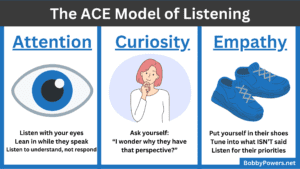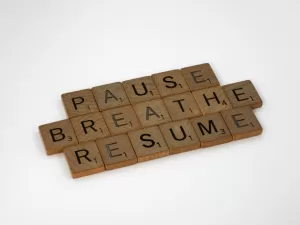Become a Better Listener with the 3-Step ACE Method
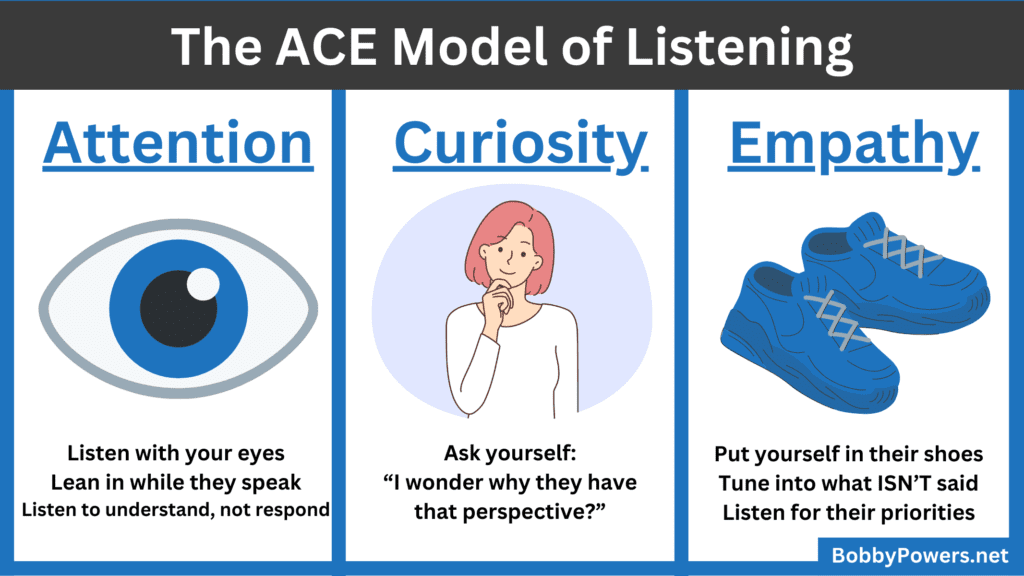
“If you’ve ever left a conversation feeling energized, inspired, or enlightened, you’ve been in the presence of a great listener — not necessarily a great speaker. The best conversationalists are the best listeners.” -Ximena Vengoechea
With all of today’s distractions and entertainment, listening is harder than ever. But it’s also imperative because it helps us put others first, make people feel cared for, and stay informed on things we need to know.
I’ve read dozens of trite listening tips over the years, so I was curious whether there’s anything new and memorable that hasn’t been said thus far about listening. I began combing books and articles for new info, then spent hours creating a new framework to remember the best tips.
That process unearthed a new model I call the ACE method for listening: we should strive to listen with Attention, Curiosity, and Empathy.
1. Listen with Attention
“The most basic and powerful way to connect to another person is to listen. Just listen. Perhaps the most important thing we ever give each other is our attention.” -Rachel Naomi Remen
A few weeks ago, my wife was telling me something, and I wasn’t doing a good job paying attention to her. She asked me if I was listening, so I rattled off the last sentence or two she said — feeling quite proud of myself.
But rattling off those words showed that I completely missed the point.
The point wasn’t whether I could recite the words. The point was whether my wife felt heard and understood. And on that more important mission, I had utterly failed.
Whoever is speaking to you doesn’t want to know you can recite a few words. Even parrots can do that. They want to feel seen and heard.
When you’re speaking to someone else, what makes you feel heard? Offer those same kindnesses to the people who speak to you:
- Listen with your eyes. Making eye contact shows that the speaker is your biggest priority.
- Lean in. Your body language conveys your interest and intent.
- Listen to understand, not to respond. Rather than formulating what you want to say or coming up with something clever, focus on learning what the other person thinks and feels.
- Put the spotlight on the speaker. Spend more time asking them questions than you do redirecting the conversation to other topics. To gauge how you’re doing on that goal, try the exercise depicted below.
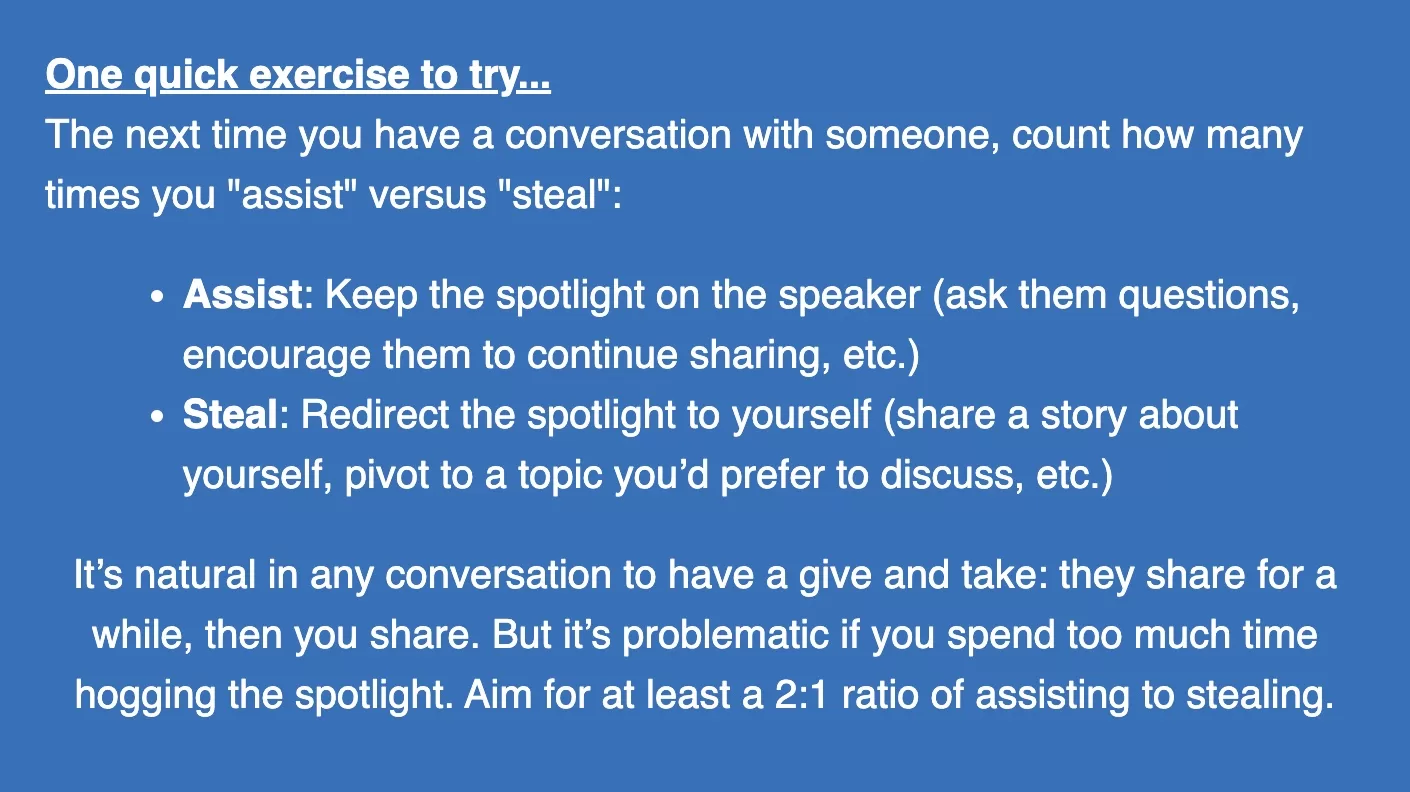
2. Listen with Curiosity
“The more you are interested in others, the more interesting they’ll find you. To be interesting, be interested.” -Kevin Kelly
One of the first times I met the man who became my father-in-law, we had a long conversation about the NBA. I’ve been a basketball fan my entire life, and I was thrilled he wanted to chat about my favorite sport.
Later, I told my girlfriend (now my wife), “I didn’t know your dad likes basketball so much.” Her response surprised me.
“He doesn't,” she said. “He just knows that you do, so he looked up a few recent scores in the paper to chat with you about something you enjoy.”
That story will always stick with me. I felt so seen and heard in that moment because he went out of his way to put me in the spotlight and give me a platform to discuss one of my passions.
We should embody this same curiosity when we talk to people every day — especially those with whom we disagree.
In today’s contentious political climate, one of the best ways to flex your listening muscle is to have a conversation with someone on the other side of the aisle. Resist the urge to correct them or assert your own beliefs. Instead, just listen and ask neutral questions.
As you’re listening, reflect upon the following questions:
- “How does their perspective differ from mine?”
- “I wonder why they have that perspective?”
- “How does their background and experience affect what they believe?”
- “If I grew up in their position, would I believe the same way they do?”
Tamp down your judgment and follow your curiosity.
3. Listen with Empathy
“Listening is not the act of hearing the words spoken. It is the art of understanding the meaning behind those words.” -Simon Sinek
Several years ago, I asked my coworker Jena what she had been learning recently. I loved her response: “I’ve been trying to get better at hearing what is NOT said in conversations. I’m now able to notice when someone withholds something, and I can ask them more about that.”
User researcher and author Ximena Vengoechea says you can think of listening like an iceberg. The only part above water is the words that are shared, but the majority of a message’s meaning lies below the surface:
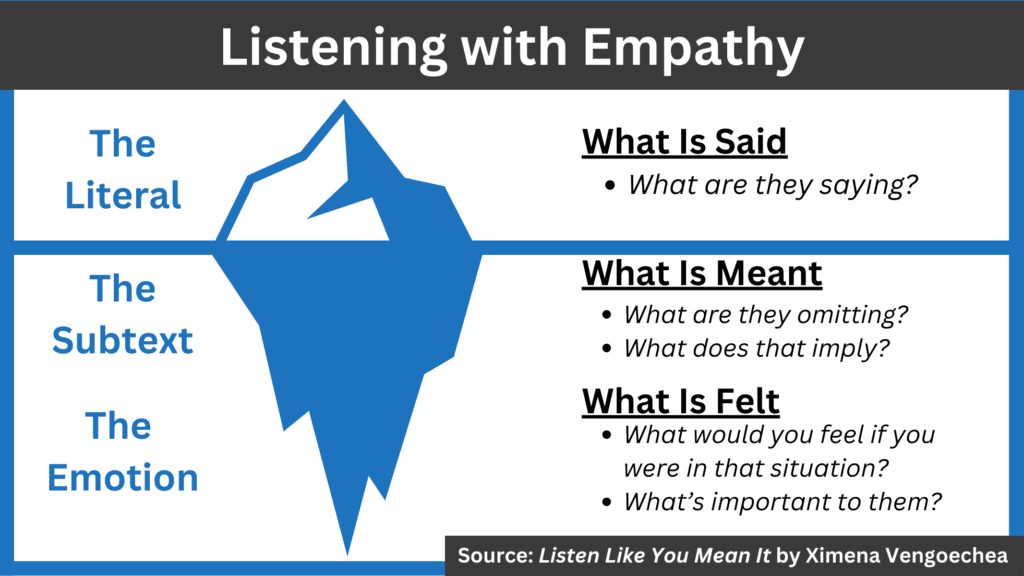
Listening with empathy means paying attention to everything going on below the surface. It’s keeping an ear open for things like the following:
- What emotions is the other person feeling right now (and why)?
- What are some of their unexpressed concerns?
- What would make them feel more safe — emotionally, physically, psychologically?
- What is most important to them?
The best listeners pick up on subtext, then reflect back what they’re hearing — holding up a conversational mirror to their partner:
- “I noticed that you’ve been talking a lot about your dad. How has your relationship been with him recently?”
- “It sounds like that was a surprise to you…”
- “I can hear in your voice that this is an emotional topic…”
Listening is a fundamentally unselfish action. It’s a way to shine the spotlight on someone else, get curious about what’s in their head, and try to feel what’s in their heart.
In your conversations with coworkers, friends, and family this week, strive to listen with Attention, Curiosity, and Empathy.
The respect you pay to them will return to you a hundredfold.
Sources (affiliate links):
Want to become a stronger leader?
Sign up to get my exclusive
10-page guide for leaders and learners.
